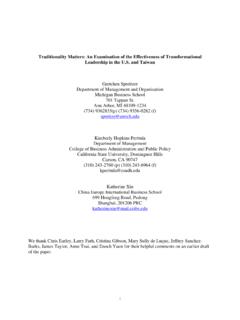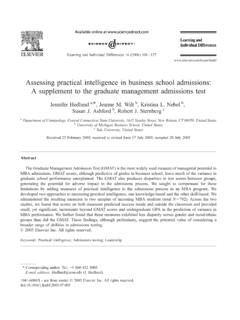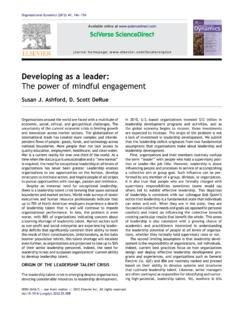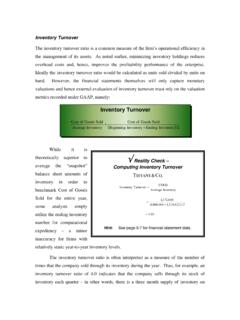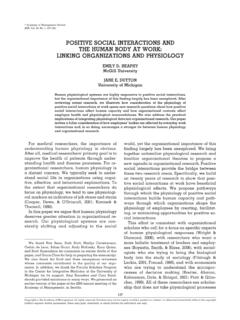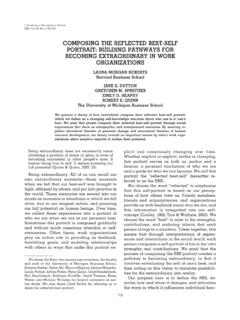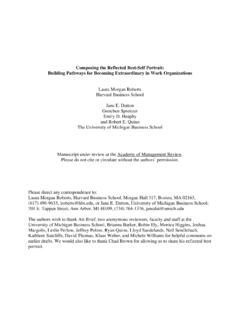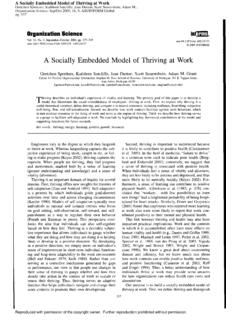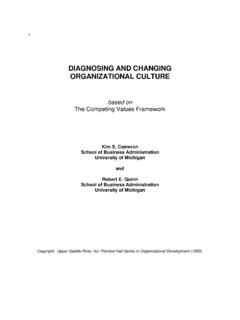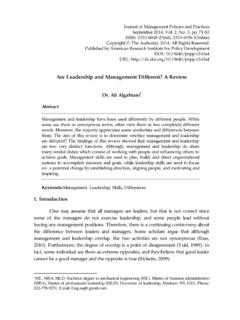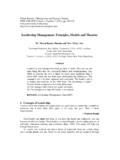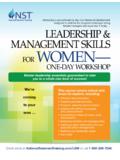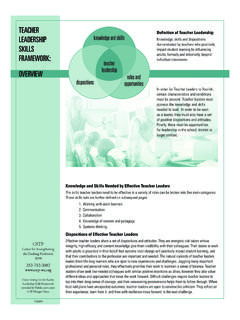Transcription of INTRODUCTION TO DEVELOPING MANAGEMENT SKILLS
1 0- 1 INTRODUCTION TO DEVELOPING MANAGEMENT SKILLS THE CRITICAL ROLE OF MANAGEMENT SKILLS No one doubts that the 21st century will continue to be characterized by chaotic, transformational, rapid-fire change. In fact, almost no sane person is willing to predict what the world will be like 50, 25, or even 15 years from now. Change is just too rapid and ubiquitous. The development of nanobombs have caused some people to predict that personal computers and desk top monitors will land on the scrap heap of obsolesce within 20 years.
2 The new computers will be a product of etchings on molecules leading to personalized data processors injected in the bloodstream, implanted in eyeglasses, or included in wristwatches. Predictions of the changes that will occur in the future are often notoriously wrong, of course, as illustrated by Charles Watson s (founder of IBM) prediction that only a few dozen computers would ever be needed in the entire world, Thomas Edison s prediction that the light bulb would never catch on, or Irving Fisher s (pre-eminent Yale economist) prediction in 1929 that the stock market had reached a permanently high plateau.
3 When Neil Armstrong walked on the moon in 1969, most people predicted that we would soon be walking on Mars, establishing colonies in outer space, and launching probes from lunar pads. In 1973 with gas lines escalating due to an OPEC-led fuel crisis, economists predicted that gasoline would sell for $100 a barrel in the United States by 1980. At the beginning of the century, the figure was around $25. Most notorious of all, of course, was the prediction by the United States patent office in 1896 that it would soon close its doors since everything that can be invented has been invented.
4 Warren Bennis half-jokingly predicted that the factory of the future would have only two employees, a person and a dog. The person would be there to feed the dog. The dog would be there to keep the person from touching the equipment! Tom Peters counseled managers that, due to the chaotic pace of change, If you re not confused, you re not paying attention. And Peter Drucker characterized the current environment this way: We are in one of those great historical periods that occur every 200 or 300 years when people don t understand the world anymore, and the past is not sufficient to explain the future.
5 Almost no one would argue that permanent white water best characterizes our current environment. Almost everything is in flux, from our technology and methods of transacting business to the nature of education and the definition of the family. Despite all this change in our environment, there is something that has remained, and continues to remain, relatively constant. With minor variations and stylistic differences, what has not changed, in several thousand years, are the basic SKILLS that lie at the heart of effective, satisfying, growth-producing human relationships.
6 Freedom, dignity, trust, love, and honesty in relationships have always been among the goals of human beings, and the same principles that brought about those outcomes in the 11th century still bring them about in the 21st century. Despite our circumstances, in other words, and despite the technological resources we have available to us, the same basic human SKILLS still lie at the heart of effective human interaction. In fact, human relationships are becoming more important, not less, as the information age unfolds and technologies encroach even more on our daily lives.
7 Most of us are exposed to more information each day than we can possibly pay attention to. Moreover, no mechanism exists to organize, prioritize, or interpret that information, so it is often unclear what is crucial and what can be ignored. Consequently, the relationship we have with the sources of that information is the key sensemaking mechanism. Building trusting relationships is a critical part of coping with information overload. It is a fact that when everything is changing, change becomes unmanageable. No one can manage constant, unorganized change.
8 Think of being a pilot on an airplane. Everything is changing he entire plane is in constant motion as the plane moves through the air. Unless you can fix on something that is not changing for example, the ground or the stars it is impossible to fly the plane. Tragically, investigators found that John F. Kennedy Jr. unknowingly flew his plane into the Atlantic Ocean killing himself, his wife, and his sister-in-law because he lost sight of land and, consequently, lost perspective. He became unable to manage change because he did not have an established, unwavering point that helped him maintain his bearings.
9 We make sense of change by being able to identify a fixed, stable, permanent point that provides us with perspective. In our current white water environment, the SKILLS discussed in this book serve as fixed points. They have changed very little in their effectiveness and relevance over several thousand years. And their relationship to effective human and organizational performance has been well-documented. Later in this INTRODUCTION we share some of the scientific research that confirms the power of these MANAGEMENT SKILLS in accounting for effective personal, interpersonal, and organizational performance.
10 The problem, of course, is that what is known is not always the same as what is demonstrated. Although we have known about the principles of effective relationships for a very long time, the history of humankind 0- 2illustrates that these principles have not always been practiced. Especially in our current day, what we know and what we demonstrate do not always match. George Carlin (1999) described it this way: The paradox of our time in history is that we have taller buildings but shorter tempers, wider freeways but narrower viewpoints.
